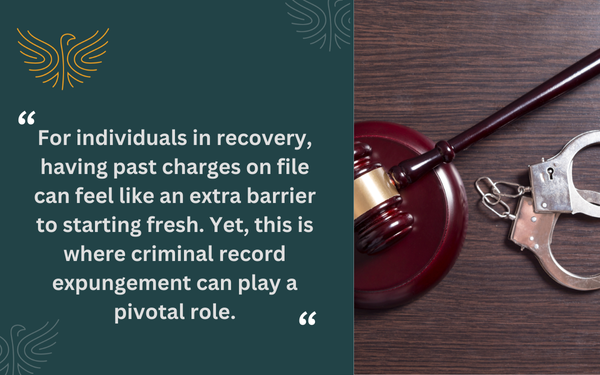When you’ve worked hard to rebuild your life after completing addiction treatment, having a criminal record can seem like another thing from your past holding you back. And some barriers can arise because of it.
The encouraging news is that, in some cases, completing treatment can play a positive role when looking to have certain charges sealed or expunged. In this article, we explore how the expungement process works, what factors courts consider, and why demonstrating your commitment to recovery can make a difference. While outcomes vary and laws differ by state, understanding your rights and options can be an important step toward a fresh start and greater stability.
_______________________________________________________
What Is Criminal Record Expungement?
A criminal record can affect many aspects of life, from job opportunities to housing and even relationships. For individuals in recovery, having past charges on file can feel like an extra barrier to starting fresh. Yet, this is where criminal record expungement can play a pivotal role.

Expungement is a legal process that allows certain criminal charges or convictions to be erased or sealed from public view. In many cases, once a record is expunged, potential employers, landlords, and others who run background checks will no longer see those charges. It’s important to note, however, that expungement is different from record sealing, pardons, or set-asides—and not all cases qualify.
Each state also has its own rules, and eligibility often depends on the type of offence, the outcome of the case, and how much time has passed.
_______________________________________________________
How Addiction Treatment Can Impact Expungement
Completing an addiction treatment program can play an important role when looking to have a criminal record expunged. Courts often look beyond the offence itself and consider the steps someone has taken toward personal change and long-term recovery. Successfully finishing treatment demonstrates accountability, stability, and commitment—all qualities that can strengthen an expungement petition.
In some cases, participation in treatment is more than beneficial; it may be a requirement. Certain diversion programs and drug courts allow individuals charged with non-violent, substance-related offences to avoid jail time or reduce penalties by completing an approved rehabilitation program. Upon successful completion, some of these programs even fast-track eligibility for expungement.
While treatment completion doesn’t automatically guarantee a cleared record, it often shows the court that someone is making meaningful efforts to rebuild their life. When paired with legal support, this progress can create a stronger case for a second chance—one that opens doors to new employment, housing, and personal opportunities.
At the same time, not everyone qualifies for criminal record expungement, and the rules vary widely depending on the state and the type of offence. However, there are several common factors courts often consider when reviewing a petition, such as:
- Type of offence: Non-violent misdemeanours are often easier to expunge, while certain felonies, violent crimes, and federal charges may not qualify.
- Outcome of the case: If charges were dismissed, you were found not guilty, or you successfully completed a diversion program, you may have a better chance.
- Time passed since the conviction: Many states require a waiting period before you can apply, ranging from several months to several years.
- Completion of sentencing requirements: This may include probation, community service, fines, or court-ordered treatment.
- Repeat offences: A clean record since the conviction can improve eligibility.
Because each state sets its own rules, it’s best to review local laws or seek legal guidance before starting the process. An attorney or legal aid organization can help determine whether you meet the necessary criteria and identify the most effective path forward.
_______________________________________________________
How Does Expungement Work?
While the exact procedure varies by state, most expungement petitions follow a similar path.
Step 1: Confirm Your Eligibility
Review your state’s expungement laws or speak with a qualified attorney to determine whether your charges can be expunged.
Step 2: Complete the Required Forms
Most courts provide expungement forms online or at the courthouse. Be sure to fill them out accurately and completely.
Step 3: Gather Supporting Documents
Include any materials that demonstrate rehabilitation and personal growth, such as:
- Certificates of treatment completion
- Letters from counsellors, employers, or mentors
- Proof of community service or educational achievements
Step 4: File Your Petition
Submit your completed forms and supporting documents to the appropriate court. Some states require filing fees, but financial assistance may be available for those who qualify.
Step 5: Attend the Hearing (If Required)
In some cases, the court may schedule a hearing. Be prepared to explain your rehabilitation progress and why expungement would help your future.
Step 6: Await the Court’s Decision
Processing times can vary from a few weeks to several months. Once approved, your record may be sealed or removed from public access.
Ultimately, Your Past Doesn’t Define You
While criminal records can create challenges, completing treatment and understanding your options for expungement can open the door to new opportunities, such as employment, housing, personal growth, and, of course, stability.
If you’re ready to take the next step, Freedom Recovery Centers (FRC) is here to help. Whether you’re starting your recovery journey or exploring ways to rebuild after treatment, we can connect you with resources, guidance, and support every step of the way. Call us at 804-635-3746 to learn more about how we can help you move forward with confidence and create a brighter, healthier future!
.svg)






.svg)

.svg)



.svg)
